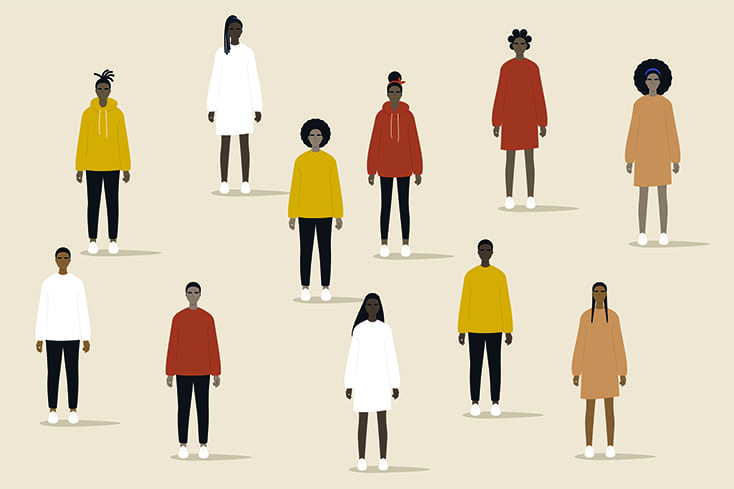July 15, 2020
By Ann Yu, Temi Akinbola, Kiana Ghahyazi and Riana Elyse Anderson Ph.D.

In the midst of the dueling health and racial pandemics impacting Americans in the past several months, the mental and physical health of Black Americans has become a central focus. Social determinants of health is a direct contributor to the overall health of Black Americans and communities, especially with respect to the following considerations:
-
Economic stability: How many residents in the area live below the poverty line? What is the unemployment rate?
-
Food: How accessible are healthy food options? Is food insecurity a topic of concern?
-
Health care system: How well-funded are the hospitals in the area? How long does it take for an ambulance to get to the place of residence? Do the staff at the local hospital display an adequate? level of cultural competency?
-
Neighborhood and physical environment: How many green spaces are in the area? What is the walkability level in the area?
-
Education: What is the average classroom size in public schools? What does funding for local public schools compare to schools in predominantly white areas look like?
-
Community and social context: How many people attend the closest polling place? What do youth services and youth development for Black youth look like?
With consideration to each of these determinants, sizable gaps exist for Black people relative to their White counterparts. While some may argue that disparities themselves drive racially-disparate outcomes, the more likely cause is that discrimination and racism embedded within systems is what creates these disparities in the first place. And, to best address challenges to Black American health, it is important to identifywhat causes disparities within the social determinants of health – such as systemic racism – rather than just focusing on what the disparities are.
How can the Black community contend with racism and discrimination?
If mental health in the Black community is impacted by racism and discrimination, is there any way to help them improve their psychological well-being as well as address their situation as a whole?
An emerging behavioral health intervention is attempting to do just that. Developed in Philadelphia, the Engaging, Managing, and Bonding through Race (EMBRace) program focuses on using the strengths that Black families have already shown in the face of racism to reduce racial stress and trauma. The program does this by combining racial socialization and other raciallyspecific coping strategies with clinically-supported stress reduction techniques. EMBRace was created by Dr. Riana E. Anderson, an assistant professor at the University of Michigan, to help improve the well-being of Black youth and families by addressing the racial stressors they far too often face.
EMBRace uses a stress-reduction strategy developed by Dr. Howard Stevenson at the University of Pennsylvania: Calculate, Locate, Communicate–Breathe and Exhale (CLC-BE). The goal of CLC-BE is to calculate how stressed, on a scale of 1 to 10, the participant feels at that exact moment, locate the stress in their body, respond to the stressor by narrating the self-talk in their mind, and engage in deep breathing exercises.
The EMBRace program also includes engaging activities such as “funwork” assignments in each session like drawing a family tree and journaling about thoughts on a current event, which helps Black families interact with each other and develop coping strategies specific to racial discrimination. EMBRace is a first step in disrupting the role of racism on other social determinants of health so that Black families can experience improved mental and physical health.
How can the health care system help this problem?
So, what does the future look like? How can we address these issues on a larger scale and create tangible change?
With respect to the social determinants of health, it is important to disrupt the systemic stressors that negatively impact mental health. One way to do this is by improving the access to mental health care and the quality of care for populations of color. This includes things like unlimited sessions with mental health professionals, free telehealth services,and being mindful of the communication and language used in mental health interventions with Black clients.
It is so important to consider the unique stressors that Black Americansface in their everyday lives and discuss solutions that directly impact those problems. We must be mindful to ensure the purpose of mental health services and supports are helpful rather than harmful.
And, most importantly, to improve the mental health outcomes of Black children and families, we must target the system responsible for such disparities in the first place. EMBRace and other culturally relevant programs are aiming to do just that. However, just as the social determinants of health are interconnected, we need to engage our extended network of mental health care training, provision and services to dismantle racism as a health-impacting system.
Ann Yu is pursuing a B.A. in Community & Global Public Healthand a minor in Business at the University of Michigan.
Temi Akinbola is pursuing a B.S. in Biomedical Engineeringat the University of Michigan.
Kiana Ghahyazi is pursuing a B.S. in Biopsychology, Cognition & Neuroscienceat the University of Michigan.
Dr. Riana Elyse Anderson is an assistant professor at the University of Michigan School of Public Health’s Department of Health Behavior and Health Education.
Submit To The NAMI Blog
We’re always accepting submissions to the NAMI Blog! We feature the latest research, stories of recovery, ways to end stigma and strategies for living well with mental illness. Most importantly: We feature your voices.
LEARN MORE